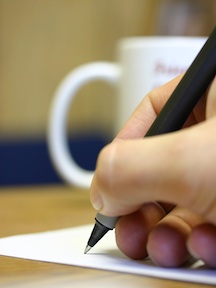By Jacob Sandstrom
On a balmy August morning, a seasoned university professor walks through the doors of a lecture hall to commence another academic year. He is met by the glowing faces of his new students, illuminated not by an eagerness to learn, but by the ubiquitous, cold reflection of a swath of computer screens. Disappointed yet steadfast, the professor asks his pupils to exchange their laptops and tablets for an oft-forgotten medium: a pen and paper.
As an audacious sophomore stomps out muttering about the old man being “out of touch,” the students stow their shiny machines. When the masses file out the door an hour later, the professor mysteriously distributes an article on the importance of handwriting. While it may not seem immediately apparent, there is a method to his madness.
According to “The Origin of Writing” published by the Metropolitan Museum of Art, writing by hand has been a documented human tradition since as early as 3200 BCE, with phonetic writing appearing around 2600 BCE on clay tablets used for “religious, political, literary, and scholarly” purposes. While the earliest proto-languages were rudimentary compared to modern language, they share a common purpose with all written languages—to serve as a medium for documentation, communication, and expression.
Though a ballpoint pen and lined paper far outperform a stylus and slab, the act is very much the same. Formulating ideas and carefully fashioning script moves thoughts from the abstract into reality, immortalizing words in a unique tactile experience. However, with the advent of mobile technology, the process has been largely reduced to a mechanical operation. As it turns out, the insistence on a laptop-free classroom does not solely rely on conventional wisdom, but also on ground-breaking psychological research.
Pam A. Mueller, a 2002 Phi Beta Kappa graduate of Loyola University Chicago, was instrumental in uncovering the hidden advantages of handwriting over typing in the classroom. Along with David M. Oppenheimer, a 2012 recipient of the Phi Beta Kappa Teaching Award at Princeton, Mueller studied the impact of medium on academic performance. Distinct from prior research on laptops as classroom distractions, Mueller and Oppenheimer sought to determine whether the differences in note-taking behavior among laptop- and notebook-using students had an effect on retention and learning, a study born of genuine curiosity.
In “The Pen is Mightier than the Keyboard,” published by Psychological Science, Oppenheimer and Mueller assert that their findings suggest in-class laptop use indeed hurts learning. One fateful trend noticed among laptop users was the tendency to take verbatim notes. While at first thought verbatim notes seem advantageous in making a “more complete record for external storage” and subsequent studying, such behavior may actually prevent students from thoroughly processing information, Oppenheimer and Mueller claim. More concerning was that even when told not to take verbatim notes, laptop users still engaged in “deleterious behavior” that was not noticed among conventional note-takers.
Oppenheimer and Mueller assert that while more-complete notes can be beneficial, “if the notes are taken indiscriminately or by mindlessly transcribing content,” students lose many of the benefits of effective classroom notetaking. Even though laptops have their advantages, longhand notetaking and its focus on “synthesizing and summarizing” information may be more desirable despite that fact that it can be more difficult. While not tested empirically, Mueller now wonders whether developing software to slow laptop notetaking or using a tablet and stylus could help bridge the gap.
Currently a Policy Researcher at RAND Corporation’s Santa Monica Office, Mueller’s background in law and social psychology propels innovative research focusing on decision making in civil law, criminal law, and criminal justice. Throughout her academic and professional career, Mueller has explored a wide array of interests, no doubt the fruit of her inquisitive spirit.
When asked about the role of Phi Beta Kappa in her life, Mueller noted that she stands behind ΦBK’s mission of supporting and honoring students who pursue vast interests through the liberal arts. “Having intellectual curiosity in many fields has led me down a seemingly winding road, but has paid off with a fantastic job where I can draw on all of that knowledge,” Mueller reflected, quipping that it “hasn’t hurt when it comes to winning money on game shows [either],” a reference to her multiple appearances on Jeopardy!. While life’s path may not always seem clear, a true love of learning brings both clarity and guidance.
Jacob Sandstrom is a junior at Case Western Reserve University majoring in Political Science. Case Western Reserve University is home to the Alpha of Ohio Chapter of Phi Beta Kappa.




